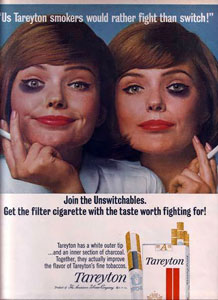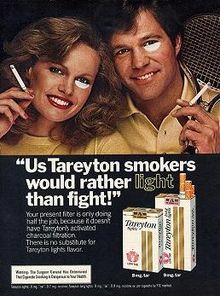
Us Tareyton smokers would rather fight than switch!
Encyclopedia

Slogan
A slogan is a memorable motto or phrase used in a political, commercial, religious and other context as a repetitive expression of an idea or purpose. The word slogan is derived from slogorn which was an Anglicisation of the Scottish Gaelic sluagh-ghairm . Slogans vary from the written and the...
which appeared in magazine
Magazine
Magazines, periodicals, glossies or serials are publications, generally published on a regular schedule, containing a variety of articles. They are generally financed by advertising, by a purchase price, by pre-paid magazine subscriptions, or all three...
, newspaper
Newspaper
A newspaper is a scheduled publication containing news of current events, informative articles, diverse features and advertising. It usually is printed on relatively inexpensive, low-grade paper such as newsprint. By 2007, there were 6580 daily newspapers in the world selling 395 million copies a...
, and television
Television
Television is a telecommunication medium for transmitting and receiving moving images that can be monochrome or colored, with accompanying sound...
advertisement
Advertising
Advertising is a form of communication used to persuade an audience to take some action with respect to products, ideas, or services. Most commonly, the desired result is to drive consumer behavior with respect to a commercial offering, although political and ideological advertising is also common...
s for Tareyton
Tareyton
Tareyton is a brand of cigarettes originally manufactured by the American Tobacco Company. It began as a variation of Herbert Tareyton cork-tipped non-filter cigarettes . As filters gained in popularity in the late 1950s, Tareyton was created in 1954 as the filtered version of Herbert Tareyton,...
cigarette
Cigarette
A cigarette is a small roll of finely cut tobacco leaves wrapped in a cylinder of thin paper for smoking. The cigarette is ignited at one end and allowed to smoulder; its smoke is inhaled from the other end, which is held in or to the mouth and in some cases a cigarette holder may be used as well...
s from 1963 until 1981. It was the American Tobacco Company
American Tobacco Company
The American Tobacco Company was a tobacco company founded in 1890 by J. B. Duke through a merger between a number of U.S. tobacco manufacturers including Allen and Ginter and Goodwin & Company...
's most visible ad campaign in the 1960s and 1970s.
Beginnings
The slogan was created by James JordanJames Jordan (publicist)
James J. Jordan, Jr. was an American ad-man and sloganeer.He is best known for his work at the BBDO advertising agency, coining such slogans as "Us Tareyton smokers would rather fight than switch!", "Wisk beats ring around the collar", and "Shaefer is the one beer to have when you're having more...
of the BBDO
BBDO
BBDO is a worldwide advertising agency network, with its headquarters in New York City. The agency began in 1891 with George Batten's Batten Company, and later in 1928, through a merger of BDO and Batten Co. the agency became BBDO...
advertising agency
Advertising agency
An advertising agency or ad agency is a service business dedicated to creating, planning and handling advertising for its clients. An ad agency is independent from the client and provides an outside point of view to the effort of selling the client's products or services...
. The first print advertisement appeared in Life
Life (magazine)
Life generally refers to three American magazines:*A humor and general interest magazine published from 1883 to 1936. Time founder Henry Luce bought the magazine in 1936 solely so that he could acquire the rights to its name....
magazine on October 11, 1963. The advertisements would appear solely in print between 1963 and 1966. In 1966, the first television advertisements with the slogan aired.
The target of the campaign was to create a sense of loyalty amongst Tareyton smokers. That led to the "rather fight than switch" campaign, in which the makeup the models wore made it seem as if they were sporting black eyes, presumably earned in battles with smokers of other cigarettes.
Like another slogan of the day, "Winston tastes good like a cigarette should
Winston tastes good like a cigarette should
"Winston tastes good like a cigarette should" is an enduring slogan that appeared in newspaper, magazine, radio, and television advertisements for Winston cigarettes from the brand's introduction in 1954 until 1972. It is one of the best-known American tobacco advertising campaigns...
," the Tareyton campaign proved to be mildly controversial as the saying was grammatically
Grammar
In linguistics, grammar is the set of structural rules that govern the composition of clauses, phrases, and words in any given natural language. The term refers also to the study of such rules, and this field includes morphology, syntax, and phonology, often complemented by phonetics, semantics,...
incorrect ("us" is an object pronoun; "we" is the correct usage here). However, unlike the former, the stigma surrounding this grammatical faux-pas was rather minor.
Television advertisements
Each commercial would begin in a predictable manner; the protagonist would do something that would be considered defiant (in one commercial, an old woman rocked sternly in her chair on her porch, while the rest of her development was being razed to make room for a condominiumCondominium
A condominium, or condo, is the form of housing tenure and other real property where a specified part of a piece of real estate is individually owned while use of and access to common facilities in the piece such as hallways, heating system, elevators, exterior areas is executed under legal rights...
). In each commercial, the protagonist would say "Us Tareyton smokers would rather fight than switch!", usually only showing their side profile to the camera. After uttering the slogan, viewers would see the smoker's face, which had a noticeable "black eye
Black eye
A black eye , or or 'shiner', is bruising around the eye commonly due to an injury to the face rather than eye injury. The name is given due to the color of bruising. The so-called black eye is caused by bleeding beneath the skin and around the eye...
" (in reality makeup), proving their willingness to fight for what they believed in, whether it be their tough decision of the day, or their choice to smoke Tareyton cigarettes. In the aforementioned example, the old woman's fighting spirit won out, and her house remained where it was, although the condominium was built alarmingly close to her property. Her son came to visit her, and it was revealed that he was a Tareyton smoker as well — he also had a black eye.
Later years

In 1971, radio and television advertisements for tobacco products were banned from American broadcasting stations, and Tareyton's television jingles ended. However, after the ban, the slogan continued to be used in magazines and newspapers, due to the slogan and the name recognition the brand received. In 1975, the slogan was used to advertise for the Tareyton "100".
In 1976, the American Tobacco Company, which made Tareyton cigarettes, introduced Tareyton Light cigarettes. In the new advertisements, men and women sported "white eyes," with an updated slogan: "Us Tareyton smokers would rather light than fight!" The two slogans would be used to sell the two separate variations until 1981, when market value declined.
This slogan was notable in that it was the final slogan used for the Tareyton brand. Declining sales led to an end of advertising the brand.
Cultural impact
The then-fresh slogan was adopted by supporters of Barry GoldwaterBarry Goldwater
Barry Morris Goldwater was a five-term United States Senator from Arizona and the Republican Party's nominee for President in the 1964 election. An articulate and charismatic figure during the first half of the 1960s, he was known as "Mr...
during the 1964 campaign for the presidency
United States presidential election, 1964
The United States presidential election of 1964 was held on November 3, 1964. Incumbent President Lyndon B. Johnson had come to office less than a year earlier following the assassination of his predecessor, John F. Kennedy. Johnson, who had successfully associated himself with Kennedy's...
. Goldwater appeared to have the nomination in hand as the primary season closed, but supporters of the moderate Republican William Scranton
William Scranton
William Warren Scranton is a former U.S. Republican Party politician. Scranton served as the 38th Governor of Pennsylvania from 1963 to 1967. From 1976 to 1977, he served as United States Ambassador to the United Nations.-Early life:...
tried to mount a "Draft Scranton" reply. "Goldwater Girls" (mostly adult women) were seen at Scranton events wearing bandages and sporting signs saying "We'd rather fight than switch!".
A 1964 single released on the Camp Records
Camp Records
Camp Records was a record label based out of California in the 1960s that specialized in producing anonymous gay-themed novelty records and singles, mostly sold out of the backs of beefcake magazines....
label parodied the slogan with the song "I'd Rather Fight Than Swish," using the slang term swish
Swish (slang)
Swish is a slang term usually used derogatorily for effeminate behaviour and interests , emphasized and sanctioned in pre-Stonewall gay male communities. This behaviour is also described as being nelly. Wentworth and Flexner define swish as a noun meaning "a male homosexual, esp...
, meaning to behave effeminately.
Thomas "TNT" Todd, a civil rights activist, parodied the slogan to make a point regarding the Vietnam War
Vietnam War
The Vietnam War was a Cold War-era military conflict that occurred in Vietnam, Laos, and Cambodia from 1 November 1955 to the fall of Saigon on 30 April 1975. This war followed the First Indochina War and was fought between North Vietnam, supported by its communist allies, and the government of...
in a 1967 speech. Todd was quoted as saying, "...Yet our best trained, best educated, best equipped, best prepared troops refuse to fight! Matter of fact, it's safe to say that they would rather switch than fight!" The audio clip of his speech was later used as the prelude to the 1989 Public Enemy single "Fight the Power
Fight the Power
"Fight the Power" is a single by American hip hop group Public Enemy. First released on the soundtrack for the film 1989 Do the Right Thing, a different version was released on the group's third studio album, Fear of a Black Planet . The single reached number one on Hot Rap Singles and number 20 on...
."
Famous "Tareyton fighters"
Many actors who would later become well-known for other reasons appeared in the Tareyton ads. Examples include future entrepreneur Martha StewartMartha Stewart
Martha Stewart is an American business magnate, author, magazine publisher, and television personality. As founder of Martha Stewart Living Omnimedia, she has gained success through a variety of business ventures, encompassing publishing, broadcasting, and merchandising...
, who appeared in a print ad, and actor Lyle Waggoner
Lyle Waggoner
Lyle Wesley Waggoner is an American actor and former model, best known for his work on The Carol Burnett Show from 1967 to 1974 and for playing the role of Steve Trevor in the Wonder Woman television series from 1975 to 1979...
, who was featured in a television commercial in 1966.

